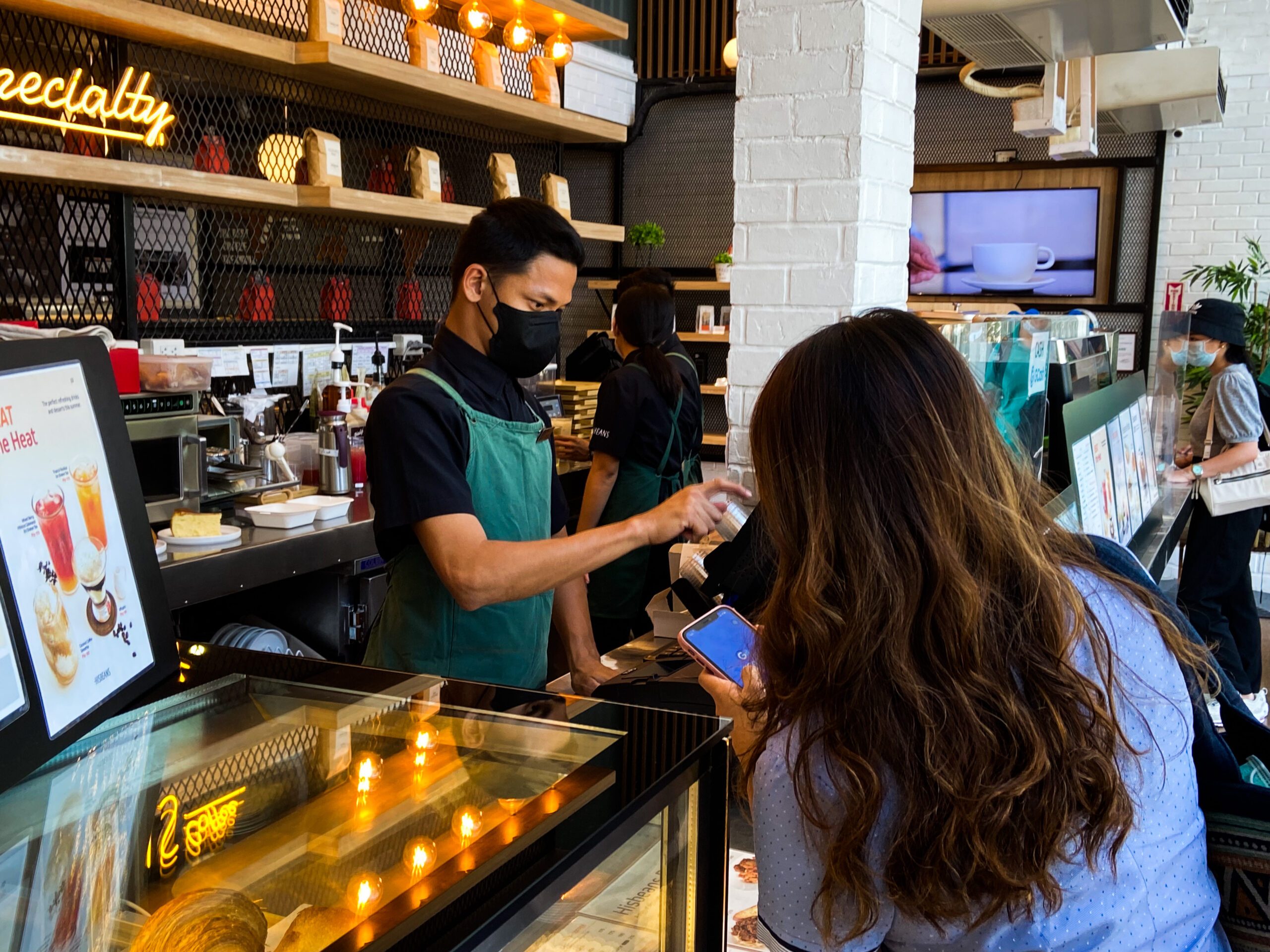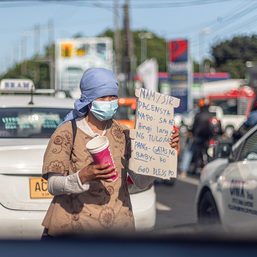SUMMARY
This is AI generated summarization, which may have errors. For context, always refer to the full article.

MANILA, Philippines – Growing up, Jona Tanalgo, 24, had a passion for learning. She dreamt of finishing her schooling and becoming a math teacher. She would know addition and multiplication by heart, only to find out that society would instead look at what makes her different.
Tanalgo has cerebral palsy, a neurological disorder that permanently affects a person’s movement, balance, and posture. In her case, the impact of this disorder is apparent only in her speech and head movement.
One time, it was even her teacher who dissuaded her from going to senior high school because of her condition, while her family was also hesitant to let her continue her education.
This signaled the end of her dreams, Tanalgo thought.
In tears, Tanalgo recalled that it was a painful experience for her. “I’m trying hard to study, but they didn’t give me a chance,” she said in Filipino.
Not easily discouraged, Tanalgo chose not to pursue further education but sought out chances to improve her abilities in cooking. This led her to a nonprofit foundation that provided skills training for persons with disability (PWD) like her.

She was optimistic that the training would equip her with the necessary skills to obtain a good job, even with her disability.
“When I was young, I dreamt of becoming a math teacher. But when I got older, I realized that I might not be able to teach well if people won’t understand me. So, I thought of cooking instead since I love it. However, I didn’t get the chance to pursue it, and now I don’t know what to do.” she added.
Structural barriers to employment
There were almost 76 million working-age Filipinos living in 2022, according to the Philippine Statistics Authority (PSA). Out of this number, 1.9 million are PWDs, according to a study that uses the PSA’s Labor Force Survey.
Based on the same study, the Philippines indicates a low labor force participation rate among PWDs. Out of the 1.9 million working-age Filipinos with a disability, only 353,000 or less than one in five were part of the workforce in January 2022. This pales in comparison to the 60.5% labor force participation for the whole population in the same time period.
Jim Nemeño, manager of Project Inclusions Network Inc., a non-profit organization that helps people with disabilities to be active members of society, said PWDs encounter various barriers even before they can obtain a job.
These include challenges in using public transportation, inaccessible job postings, attitudinal barriers such as being pitied instead of treated as equals, and limited accessibility to general and skills education.
“These barriers combine to create institutional barriers that affect policies, practices, and opportunities for PWDs in the workforce,” Nemeño said.
Like Tanalgo, Filipino PWDs are often at a disadvantage to begin with due to their low educational attainment, resulting in companies not hiring them because of the skills and qualifications gap.
As a consequence, more than one in four Filipino PWDs work in elementary occupations such as street-sweeping, domestic work, and ambulant vending, which are often low-paying and highly insecure jobs.
After her friend informed her about a job opening, Tanalgo decided to apply for a data encoding position in a company that was located far away from her residence in Quezon City.
She knew she could do the job with confidence, but as soon as Tanalgo arrived at the location, the hiring manager immediately rejected her job application.
“Nagulat na lang po ako na pagkadating ko, isang tingin lang sa akin, hindi man lang ako ininterview o tinanong, hindi na ako tinanggap agad,” she said.
(I was surprised that upon arriving, with just one look at me, I was not even interviewed or asked any questions, and I was not immediately accepted.)
Tanalgo said the company did not even bother to ask about her skills and what she could contribute to the company.
“Kahit hindi ko iyon alam, matutunan ko naman iyon basta tuturuan ako. Kaya malakas ang loob ko na bumiyahe [para mag-apply] kahit malayo kasi gustong-gusto ko na talaga mag-work,” Tanalgo said.
(Even though I don’t know that, I can learn it as long as someone teaches me. That’s why I have the courage to travel [to apply] even if it’s far because I really want to work.)
Assets to the workplace
Tanalgo’s persistence paid off as she was able to secure a job as a cashier at a Korean restaurant for three months. However, the restaurant was one of the many businesses that had to close down due to the pandemic, and as a result, she did not return to work as a cashier.
The labor situation for Filipino PWDs even worsened during the pandemic. PWD’s labor force participation dipped from 22% in January 2019 to 18% in the same month of 2022. Meanwhile, unemployment among PWDs rose from 4.5% to 7% over the same period, still according to the same study.
Reflecting on her work experience, Tanalgo shared that even though it was short, it gave her a great deal of self-confidence and motivation to keep going.
“Masaya ako doon kasi nakakapagtrabaho ako at nag-e-enjoy ako sa ginagawa ko. Kaya ko palang makipagsabayan sa mga tao – ang saya pala nang ganoon kahit ganito ako. Hindi ako nakaramdam ng pagtingin na iba ako,” she said.
(I am happy there because I am able to work and enjoy what I am doing. I realized that I can keep up with other people – it feels good even though I am like this. I did not feel any sense of being different.)
Republic Act No. 10524, otherwise known as the Magna Carta for Persons with Disability, mandates that all government agencies, offices, or corporations reserve at least 1% of their positions for individuals with disabilities. Private corporations with more than 100 employees are also encouraged to follow suit.
Inclusive workplace
Hisbeans Cafe, a Korean cafe business in Quezon City hires only PWDs.

“Our advocacy at Hisbeans Cafe is to promote hiring persons with disabilities and to show that they are capable of doing jobs well. We don’t label our employees as PWDs on their nametags, allowing them to be treated equally without discrimination,” said Hannah Kim, branch manager of Hisbeans Cafe in the Philippines.
Kim emphasized that the company does not look at the educational background of their applicants, but instead at their character and communication skills.
“That is the best part of working here – that people did not notice these people are PWD because they are working perfectly fine and do not need to be discriminated against,” she added.
Just like other companies, Kim shared they also encounter challenges and problems with their employees.
“Managing human resources is a challenge, regardless of whether an employee is a PWD or not. As advocates for PWDs, we understand the unique challenges they face and strive to communicate effectively to solve problems,” she explained.
Joshua Infantado, 25, a person with a developmental disability, said working at Hisbeans Cafe not only gave him financial independence, but also boosted his self-esteem and allowed him to show others that PWDs can excel in the workplace.

“Before, I struggled because people would ridicule me and say that I could not achieve anything. That’s why I am trying my best to show them that I can achieve something,” he said in Filipino.
Infantado said he has found a safe space and a family in the company of fellow workers at Hisbeans Cafe. He also shared that their management treats all employees fairly without discrimination.
“When I have difficulty, I just ask and they teach me properly. I have never really experienced any problems [working] here,” he added.
As of writing, all baristas and employees of Hisbeans Cafe are PWDs – three deaf or hard of hearing (HoH), two blind, and two persons with developmental disabilities.
Breaking the barriers, looking beyond the disability
Kim hopes that other companies in the Philippines would also look beyond the disability and instead see what PWDs can offer.
“It’s not about their disability but about the person. PWDs have the same emotions and aspirations as everyone else, and it is unfortunate that their passions and potentials are often overlooked by companies,” she said.
Nemeño noted that the government should provide support to PWDs not just in terms of employment but also in strengthening education programs, given that the educational gap is a major barrier to PWDs’ employment.
“PWDs should have access to the same education as non-PWDs. This will provide them with the baseline skills necessary to participate in the workforce,” Nemeño added.
Tanalgo remains hopeful that she will land a job someday. Like millions of others, she aspires for a future where individuals like her could obtain respectable employment without facing discrimination, where they can also be seen for what they can do, instead of what they can’t.
“For people like me, if you know in yourself that you are capable of doing it, do not give up just because others say you can’t do it. If you can do it, fight for it,” Tanalgo said. – Rappler.com
Add a comment
How does this make you feel?
![[OPINION] Unpaid care work by women is a public concern](https://www.rappler.com/tachyon/2024/07/20240725-unpaid-care-work-public-concern.jpg?resize=257%2C257&crop_strategy=attention)




There are no comments yet. Add your comment to start the conversation.